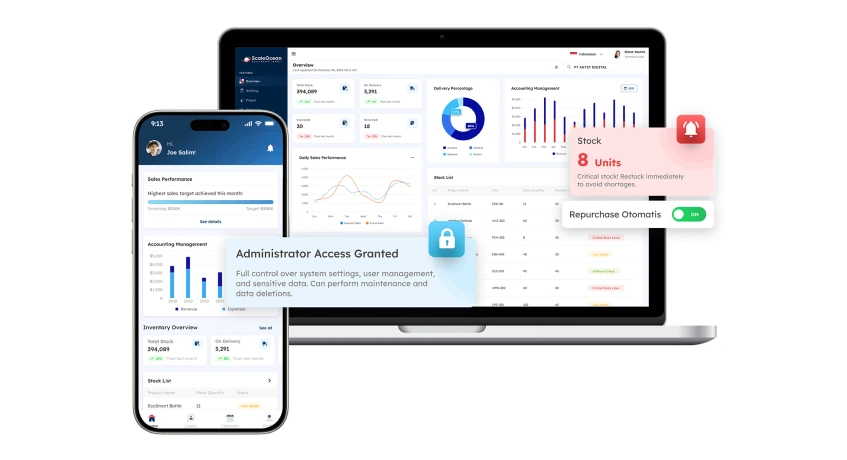In Singapore’s fast-paced business environment, companies are increasingly using innovative technologies to stay ahead in a competitive market. One popular method is Hybrid ERP, which combines the benefits of on-premise and cloud-based systems.
A hybrid ERP system that combines both on-premise and cloud solutions provides companies with a versatile and flexible option. This approach enables companies in Singapore to benefit from the strong security of on-premise systems for sensitive information, while also taking advantage of the scalability and user-friendliness of cloud technologies.
This model provides businesses with the agility to streamline operations effectively while ensuring robust data security. According to ResearchNester, from market research, the system sector in Singapore is anticipated to expand at a compound annual growth rate (CAGR) of 13.29% during the forecast period, highlighting its growing popularity among local enterprises.
By adopting these solutions, companies in Singapore can boost operational efficiency, achieve greater scalability, and respond quickly to shifting market demands, fostering long-term growth and adaptability in an ever-changing economic environment.
In this article, we will look at what hybrid ERP is, how it works, and the key advantages it offers for businesses. Understanding these advantages can help businesses make informed decisions about their ERP strategy and remain competitive in today’s digital world.
- Hybrid ERP is a flexible solution that combines on-premise security with cloud scalability, offering businesses enhanced performance and data protection.
- A hybrid ERP works by combining two environments, strategic deployment, and utilizing common arrangements.
- Key benefits of a hybrid ERP are data security and compliance, flexibility and scalability, optimized costs, phased cloud migration, innovation, seamless integration, improved performance, and reliability.
- ScaleOcean’s hybrid ERP is a the best solutions that offering seamless ERP implementation, combining cloud and on-premise features to optimize business operations and ensure data security.

What is Hybrid ERP?
A hybrid ERP is an Enterprise Resource Planning (ERP) system that integrates both on-premises and cloud-based solutions. This method enables companies to keep sensitive data on-premises for greater control and security, while utilizing the cloud’s flexibility and scalability for other operations.
It’s commonly used by businesses moving toward cloud adoption or integrating a new cloud-based subsidiary system with an existing on-premise ERP. The system can enable companies to select the most suitable deployment option for applications and the protection of sensitive data while accessing cloud-based features.
By adopting this system, businesses can optimize operations, reduce IT costs, and scale efficiently without being limited to a single deployment model. It is suitable for businesses looking for a comprehensive ERP solution that improves performance, security, and flexibility in today’s fast-paced business environment.
The use of this method will provide superior benefits for businesses, from flexibility in adapting ERP systems to meet changing needs, regulatory changes, and technological advances. Addressing common ERP system failures and solutions ensures businesses can effectively navigate these challenges.
Cost-effectiveness can also be achieved with ERP, so that it can reduce overall costs. This System also combines on-premises system security features with advanced cloud-based security measures.
How Does Hybrid ERP Work?
Hybrid ERP systems combine the best of both on-premise and cloud environments, offering flexibility, control, and scalability. By integrating these two components, businesses can create a tailored system that meets their specific needs. Here’s how hybrid ERP systems function:
1. Combines Two Environments
Hybrid ERP integrates both on-premise and cloud components, allowing them to work seamlessly as one unified system. This integration enables businesses to benefit from the security and control of on-premise software while tapping into the flexibility and scalability of cloud-based applications.
2. Strategic Deployment
With hybrid ERP, companies can strategically deploy on-premise systems for critical functions like financials, manufacturing, and inventory management. Meanwhile, cloud applications can handle areas like HR, sales, and customer service, ensuring that businesses can optimize each component for its specific needs.
3. Common Arrangements
Two common arrangements in hybrid ERP are the two-tier ERP model and function-specific solutions. In the headquarters runs an on-premise system runs, while subsidiaries use cloud-based ERPs.
Function-specific solutions involve combining cloud-based modules with on-premise systems to optimize specific functions, such as CRM or mobile access, while the main system remains on premises.
Advantages of Hybrid ERP
Businesses in Singapore can achieve greater flexibility, security, and cost efficiency by implementing a software solution that adapts to industry demands. This approach combines on-premise systems with cloud technology, ensuring up to 85% smoother operations.
Here are the Advantages and also the 8 reasons why companies should to deploy the hybrid ERP, including:
- Data Security and Compliance. In highly regulated industries like healthcare and finance, a hybrid ERP system allows companies to maintain strict control over sensitive data by keeping it on-premises. This helps ensure compliance with regulatory standards, such as HIPAA or GDPR.
- Flexibility and Scalability. It can tap into cloud resources to scale certain function based on real-time needs, such as during peak sales periods. This ensures that companies can easily adjust to fluctuating demand, offering cost efficiency while maintaining agility in operations.
- Optimized Costs. Hybrid ERP allows businesses to leverage their existing on-premise infrastructure and avoid the high upfront costs of fully replacing systems. By subscribing to cloud services for specific needs, companies can balance large capital expenditures (CapEx) with predictable operating costs (OpEx).
- Phased Cloud Migration. A hybrid ERP model facilitates a gradual transition to the cloud, allowing businesses to migrate one function or module at a time across a single platform. With choosing the best Singapore ERP software, companies can seamlessly integrate various functions, ensuring smooth operations during the migration process.
- Innovation Businesses. Hybrid ERP systems enable businesses to integrate cutting-edge cloud technologies, such as advanced analytics and mobile applications, without disrupting core on-premise systems. It also allows companies to innovate rapidly and access new capabilities while maintaining the stability and reliability of their existing ERP infrastructure.
- Seamless Integration with Existing Systems. The hybrid system combines with existing on-premise and cloud-based applications to streamline corporate processes without requiring a major system redesign. This seamless integration enables businesses to maximize previous ERP investments while adopting modern cloud functionalities, enhancing efficiency and reducing disruption.
- Improved Performance and Reliability. Leveraging both on-premise and cloud systems ensures consistent performance and system uptime. On-premise components provide reliability for mission-critical tasks, while cloud services enhance speed and accessibility. This balance enables companies to maintain smooth operations without facing downtime or performance issues.
- Better Remote Accessibility and Collaboration. It allows employees to access real-time data from any location. Teams can collaborate seamlessly, whether working in the office or remotely.
This improved accessibility boosts productivity, improves decision-making, and assures that corporate processes remain unaffected by geography. Besides that, you can also use the mobile ERP software, businesses can further enhance flexibility and operational efficiency.
Challenges of Hybrid ERP
While a hybrid ERP system offers numerous advantages, it also comes with its own set of challenges. These challenges can increase complexity and costs, and require careful management to ensure that both the on-premise and cloud components work seamlessly.
Here are some key challenges that businesses may face when implementing a hybrid ERP system, including:
- Integration Complexity. To function as a cohesive platform, hybrid ERP systems require seamless integration between on-premise and cloud components. This often involves custom integrations, middleware, and data synchronization, which can be costly. Understanding what custom ERP and off-the-shelf ERP are can help navigate these integration challenges.
- Increased Management Overhead. A hybrid ERP environment demands specialized IT expertise to manage both on-premise and cloud technologies. Maintaining and supporting these dual deployments often requires more personnel or training, resulting in higher management costs. The complexity of managing two systems can also increase the risk of errors, requiring ongoing attention to ensure both environments operate smoothly and securely.
- Security Risks. Managing security in a hybrid ERP system can be challenging, as it expands the security perimeter to include both on-premise and cloud environments. IT teams must implement consistent security policies and governance to protect data across both platforms. Any lapse in security measures increases the risk of vulnerabilities, potentially exposing sensitive data to cyber threats if not managed meticulously.
- Potential for Latency. Hybrid ERP systems rely on data transfers between on-premise and cloud systems, which can introduce latency or performance issues. This delay in data synchronization may affect real-time business processes. Particularly in time-sensitive functions like inventory management or customer service, ensuring minimal latency is crucial to maintaining operational efficiency. Besides that, you can also use the SaaS ERP to streamline customer interactions, preventing disruptions in critical workflows.
- Upgrade Conflicts. Hybrid ERP systems face challenges with upgrades due to different upgrade cycles between on-premise and cloud components. The incompatibility between new versions of the two systems can cause integration issues, requiring additional maintenance and troubleshooting. These conflicts may lead to downtime or operational disruptions, making regular and coordinated updates essential to keep both systems aligned and functioning properly.
- Higher Initial and Ongoing Costs. It can reduce some costs but often demands significant upfront investments in on-premise infrastructure and cloud services. Ongoing expenses like IT staffing, integration tools, and potential downtime can add up, making it costlier than fully cloud or on-premise solutions over time. However, businesses can mitigate these costs by leveraging various modules of ERP finance, which offer advanced financial management capabilities to streamline processes and improve overall cost efficiency.
- Limited Scalability Compared to Full Cloud Solutions. The system offers some scalability but may lack the agility of full cloud solutions. On-premise components can slow rapid scaling during growth or demand shifts, causing bottlenecks and reduced efficiency, particularly for businesses with dynamic or unpredictable needs.
- Vendor Dependency and Lock-In Risks. Relying on multiple vendors for on-premise and cloud solutions can create dependency issues. Businesses may face challenges if vendors change pricing, discontinue services, or provide inadequate support. Transitioning from the hybrid method can also be difficult due to vendor lock-in, hindering the adoption of new technologies or switching providers. To address this, you must choose a hybrid ERP vendor capable of easy and comprehensive system integration and transformation.
For implementing hybrid ERP efficiently and avoiding problems in its use, you can use the Scaleocean ERP system, which provides enterprise-level system integration across hybrid, mobile, and cloud platforms.
Scaleocean also offers system customization, allowing you to tailor the system and its type to your business needs. For a flat fee, you can optimize all business functions with a Scaleocean-compliant system. Do the free demo now to get this solution!

Hybrid ERP Considerations
When implementing a Hybrid ERP system, businesses must carefully evaluate several key factors to ensure the solution aligns with their needs. One of the most important considerations is data management.
With Hybrid ERP, data is typically split between on-premise systems and cloud platforms, requiring robust management strategies to ensure seamless integration and security. Businesses must establish clear protocols for data synchronization, ensure compliance with industry regulations, and implement data redundancy measures to avoid disruptions.
Additionally, data governance becomes crucial to prevent inconsistencies between the two environments, requiring reliable backup systems and real-time monitoring. Effective data management will not only optimize ERP performance but also safeguard critical information, ensuring a smooth, efficient, and secure operation.
Hybrid ERP Implementation Process: 6 Steps
Setting up a hybrid system involves careful planning, smooth integration, and ongoing improvements. Businesses need to align the system with their operations while ensuring an easy data transfer and adoption process. Below is a step-by-step guide to successfully implementing a hybrid solution.
1. Assess Business Requirements and Goals
Before implementation, businesses must evaluate their operational needs, data security concerns, and scalability requirements. A thorough evaluation helps set clear ERP goals, making sure the hybrid system fits business operations, industry rules, and future growth plans. Well-defined objectives create a strong foundation for a smooth and successful implementation.
2. Select the Right Hybrid ERP Solution
Choosing the right ERP hybrid system depends on business size, industry requirements, and integration capabilities. Companies should assess vendor offerings, comparing cloud and on-premise features, customization options, and security measures. Selecting a scalable, flexible, and user-friendly solution ensures long-term efficiency and adaptability.
3. Plan Data Migration and System Integration
Migrating data from legacy systems to an ERP hybrid system requires careful planning. Businesses must clean, organize, and categorize data to prevent inconsistencies. One essential step in this process is erp consolidation, which helps streamline data from various sources into a unified system.
Integration technologies enable seamless communication between on-premise and cloud components, ensuring data accuracy, avoiding disruptions, and promoting smooth company operations.
4. Configure and Customize the ERP System
Once the ERP is deployed, businesses must configure workflows, user roles, and automation features. Customization ensures the system meets industry-specific requirements. By aligning ERP functionalities with business processes, companies can maximize efficiency, streamline operations, and improve overall system usability.
5. Train Employees and Ensure User Adoption
A successful ERP implementation depends on user adoption. Businesses should conduct training programs, educating employees on system features, data management, and security protocols. Providing hands-on support and clear documentation helps employees transition smoothly, ensuring effective utilization of the Hybrid system.
6. Monitor Performance and Optimize Continuously
Post-implementation monitoring is crucial to address system issues and optimize performance. Businesses should track key performance indicators (KPIs), gather user feedback, and make necessary updates. Regular optimizations help keep the system efficient, scalable, and aligned with changing business needs.
Key Use Cases for Hybrid ERP
Hybrid ERP systems are ideal for businesses that need to combine the reliability of on-premise systems with the flexibility of cloud solutions. This model is particularly beneficial for large organizations and those in need of a flexible, scalable, and secure approach. Below are key use cases where hybrid ERP excels:
1. Large Companies with Smaller Subsidiaries
Large enterprises with multiple subsidiaries often use hybrid ERP systems to manage complex, global operations. The headquarters can retain an on-premise ERP for critical functions, while subsidiaries use cloud-based systems tailored to their local needs, ensuring a seamless, efficient workflow.
Large enterprises with multiple subsidiaries often use hybrid ERP systems to manage complex, global operations. The headquarters can retain an on-premise ERP for critical functions, while subsidiaries use cloud-based systems. Enterprise software integration ensures seamless data flow between these systems.
2. Physically Separated Workloads
For organizations with distributed operations, a hybrid ERP allows businesses to separate workloads across different locations. Critical functions, like financials, can remain on-premise, while less sensitive operations, such as CRM or HR, can be managed through cloud solutions, ensuring efficient management across geographies.
3. Phased Implementations
Hybrid ERP is ideal for companies that want to migrate to the cloud gradually. Businesses can keep their core operations on-premises while moving select functions to the cloud in phases. This approach reduces risk, allows for smoother transitions, and minimizes disruptions during the implementation process.
4. Vendor Collaborations
In industries where collaboration with external vendors is crucial, hybrid ERP enables seamless communication and data sharing. Cloud-based ERP modules can be used for supply chain management, while on-premise systems handle more sensitive data, creating a unified, secure environment for vendor partnerships.
5. Mobile Access
With hybrid ERP, companies can provide mobile access to cloud-based modules, such as sales and customer service, while maintaining control over core processes like financials or manufacturing on-premise. This flexibility ensures that employees can access critical data from anywhere while keeping key functions secure.
6. Rapid Innovation
For businesses looking to integrate new technologies quickly, hybrid ERP enables rapid innovation. Companies can add new cloud-based modules, such as advanced analytics or IoT integrations, without disrupting existing on-premise systems, allowing them to stay competitive while leveraging the latest innovations.
Key Use Cases for Hybrid ERP in Different Industries
The hybrid system is ideal for businesses across various industries that require a combination of on-premise control and cloud flexibility. It enables companies to optimize operations, ensure data security, and scale efficiently. Here are six key industries that benefit from ERP hybrid system implementation.
- Manufacturing. The system can be use to integrate supply chain management, inventory tracking, and production planning. On-premise systems handle real-time factory operations, while cloud solutions enable remote monitoring and analytics. This setup ERP system can also improve production efficiency, reduce downtime, and ensure seamless collaboration between different locations.
- Global Enterprises. The global enterprises with multiple regions or subsidiaries benefit from hybrid ERP by keeping core systems on-premise for central control, while regional offices use cloud-based ERP modules tailored to their local needs. This setup provides scalability, operational efficiency, and seamless data sharing across locations.
- Healthcare and Pharmaceuticals. The hybrid ERP ensures compliance with strict regulations by keeping sensitive patient or drug data on-premise while utilizing cloud-based applications for tasks like inventory management and CRM. This setup provides a secure, compliant environment while enabling flexibility in operations.
- Retailers with E-Commerce. The system can be used to integrate both online and offline operations. The on-premise system handles core inventory and financial data, while the cloud-based solution manages customer interactions, online orders, and marketing, ensuring a seamless omnichannel experience.
- Technology and Software Companies. The systems can manage both product development and customer support. On-premise ERP systems handle critical project management and billing, while cloud-based modules support collaboration, customer service, and data analytics, enabling innovation and flexibility in fast-paced environments.
- Financial Services. Banks and financial institutions use the hybrid to balance security with digital transformation. Sensitive financial information is kept on-premise, while cloud-based applications handle client interactions, reporting, and compliance tracking. This configuration improves cybersecurity, and scalability allows for speedier decision-making by providing real-time financial data.
- Logistics and Supply Chain. ERP hybrid system supports logistics companies in managing fleet operations, warehousing, and supply chain visibility. On-premise systems control critical logistics infrastructure, while cloud-based tools provide real-time tracking, automated workflows, and demand forecasting. This provides effective delivery management, cost savings, and better customer service.
- Construction. The system helps manage large-scale projects with various stakeholders. On-premise software handles budgeting, compliance, and workforce management, while cloud applications enable remote access to project updates, contract management, and supplier coordination. Implementing a hybrid ERP also promotes collaboration, reduces project delays, and enhances overall productivity.
Use a Flexible Hybrid ERP with Scaleocean ERP Software
In today’s fast-paced business environment, Singaporean enterprises want a flexible and adaptable ERP solution to remain competitive. ScaleOcean Hybrid ERP combines cloud and on-premise features to ensure peak performance, robust data security, and easy integration.
Whether you’re an SME or a large enterprise, ScaleOcean simplifies operations, enhances decision-making, and supports business growth. Take a closer look at how it can meet your needs with a free demo.
From real-time data analytics to seamless supply chain integration, ScaleOcean offers key features designed to optimize efficiency as below.
- Hybrid Deployment: Combines cloud and on-premise for flexibility, security, and scalability.
- Multi-Currency Support: Enables seamless international transactions for global business operations.
- Real-Time Data Analytics: Provides instant insights for better decision-making.
- Comprehensive Financial Management: Manages accounting, budgeting, and financial reporting with ease.
- Inventory & Warehouse Management: Optimizes stock levels and warehouse operations.
- Supply Chain Integration: Streamlines procurement, logistics, and vendor management.
ScaleOcean ERP hybrid system provides businesses in Singapore with a combination of cost-efficiency, adaptability, and productivity. Integrating cloud capabilities with on-premise security ensures that companies can leverage the best of both worlds, enhancing operational efficiency while keeping critical data protected.
With real-time analytics and AI-driven automation, businesses can streamline workflows, reduce manual errors, and make more informed decisions. Designed to meet Singapore’s financial regulations and tax requirements, ScaleOcean hybrid ERP offers a compliance-ready solution tailored for the local market.
Whether improving supply chain management, strengthening customer relationships, or gaining deeper business insights, this scalable and future-ready system empowers companies to stay agile and competitive in an evolving business landscape.
Conclusion
Hybrid ERP is becoming an essential solution for businesses in Singapore, offering the perfect balance between on-premise security and cloud-based flexibility. As companies face evolving market demands, a hybrid ERP system ensures scalability, cost-efficiency, and seamless integration with existing processes.
From manufacturing and retail to healthcare and financial services, industries across the board benefit from its ability to enhance operational efficiency, improve collaboration, and maintain regulatory compliance.
For companies looking for a reliable, scalable, and secure ERP solution, ScaleOcean Hybrid ERP provides a tailored approach that meets diverse business needs. Its combination of real-time analytics, supply chain optimization, and financial management ensures businesses can streamline operations and drive growth.
Whether you’re a growing SME or a large enterprise, ScaleOcean provides the flexibility and efficiency needed to navigate a rapidly evolving market. Explore its capabilities with a free demo and see how it can support your business operations.
FAQ:
1. What is the difference between premise cloud and hybrid ERP systems?
On-premise ERP provides the highest level of control and customization, though it tends to be the most costly and difficult to manage. Hybrid ERP strikes a balance between cost and control, but may not offer the same level of security as a fully cloud-based system.
2. What does hybrid mean in software?
If a software product is offered as Hybrid SaaS or Hybrid Cloud, it means that it combines elements of both Software-as-a-Service (SaaS) and on-premises software deployment models. In the case of a hybrid model, the software product offers a combination of cloud-based SaaS functionality and on-premises capabilities.
3. What is the hybrid transition strategy of ERP?
Hybrid Transition Strategy: It is a combination of many implementation techniques, including process line, phasing, and parallel implementation. As the ERP team examines and assesses data, hybrid techniques often become a required approach.
4. What is a hybrid ERP system?
A Hybrid ERP system combines on-premise and cloud solutions, providing businesses with a flexible and scalable approach. It enables organizations to utilize the security of on-premise systems for sensitive data, while benefiting from the scalability and convenience of cloud-based features.












 PTE LTD..png)
.png)

.png)








.png)
.png)
















